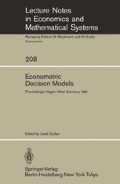Abstract
In this paper, game theoretic solution concepts are applied to a dynamic linear-quadratic econometric decision model with more than one decision maker. Noncooperative Nash- and Stackelberg-, and cooperative Nash-Harsanyi-solutions are given. The cooperative Nash-Harsanyi solution concept allows the determination of a social preference function which reflects the individual objectives of the single decision makers with a fair weight. The theoretical discussion will be closed by a numerical illustration.
Access this chapter
Tax calculation will be finalised at checkout
Purchases are for personal use only
Preview
Unable to display preview. Download preview PDF.
References
Brent, R.P., Algorithms for minimization without derivatives. Englewood Cliffs, 1973.
Bürk, R., Kooperation and Konflikt in einem dynamischen makroökonomischen Kreislaufmodell.Dissertation. Karlsruhe 1976.
Chow, G., Analysis and Control of Dynamic Economic Systems. NewYork 1975. Clemhout, S., G. Leitman and H.Y. Wan, “A Differential Game Model of Oligopoly”, Journal of Cybernetics, 1973, p. 24–39.
DaCunha, N.O. and E. Polak, “Constrained Minimization Under Vector-Valued Criteria in Finite Dimensional Spaces”, Journal of Mathematical Analysis and Application, 1967, p. 103–124.
Haas,H., A Generalization of Chow’s Algorithm from One to Several Noncooperative Controllers. Discussion paper no. 66, Faculty of Economics, University Bielefeld. Bielefeld 1979.
Haas,H., Optimale Steuerung unter Berücksichtigung mehrerer Entscheidungsträger. Bielefeld 1981.
Harsanyi,J.C., “A Bargaining Model for the Cooperative n-Person Game”, Annals of Mathematics Studies 40, Princeton and NewYork 1959, p. 325–355.
Harsanyi,J.C., Rational Behaviour and Bargaining Equilibrium in Games and Social Situations. Cambridge 1977.
HO, Y.C., “Differential Games, Dynamic Optimization and Generalized Control Theory”, Journal of Optimization Theory and Application, 1970, p. 179–209.
Kydland, F., “Noncooperative and Dominant Player Solutions in Discrete Dynamic’Games”, International Economic Review, 1975, p. 321–335.
Nash, J., “Non-Cooperative Games”, Annals of Mathematics 54, 1951, p. 286–295.
Nash, J., “Two-Person Cooperative Games”, Econometrica, 1953, p. 128–140.
Olsder, G.J., “Information Structures in Differential Games”, in: Roxin, E., P. Lin and R. Sternberg, Differential Games and Control Theory II. NewYork and Basel 1977, p. 99–135.
Pau, L.F., “Differential Games among Sectors in a Macroeconomy”, in: IFAC/IFORS(ed.), International Conference on Dynamic Modelling and Control of National Economies, Stavenhage 1973, p. 254–270.
Pindyck, R.S.,”Optimal Economic Stabilization Policies under Decentralized Control and Conflicting Objectives”, IEEE Transactions on Automatic Control, 1977, p. 517–530.
Plasmans, J. and A. de Zeeuw, Nash, Pareto and Stackelberg solutions for Interplay, a model for the Common Market. Discussion paper no. 80 108, Department of Economics,Subfaculty of Econometrics, Tilburg University Nederland. Tilburg 1980.
Selten, R., “Spieltheoretische Behandlung eines Oligopolmodells mit Nachfrageträgheit”, Zeitschrift für die gesamte Staatswissenschaft, 1965, p. 301–324, 667–689.
Simaan, M. and J.B. Cruz, “On the Stackelberg Strategy in Nonzero-Sum Games”, Journal of Optimization Theory and Application, 1973a, p. 535–555.
Simaan, M. and J.B. Cruz, “Additional Aspects of Stackelberg Strategies in Nonzero-Sum Games”, Journal of Optimization Theory and Application, 1973b, p. 613–626.
Stackelberg, H. von, Marktform and Gleichgewicht. Wien and Berlin 1934. Starr, A.W. and Ho, Y.C., “Nonzero-Sum Differential Games”, Journal of Optimization Theory and Application, 1969a,p. 184–206.
Starr, A.W. and HO, Y.C., “Further properties of Nonzero-Sum Differential Games”, Journal of Optimization Theory and Application, 1969b, p. 207–219.
Theil, H., Optimal Decision Rules for Government and Industry. Amsterdam 1964.
Zadeh, L.A., “Optimality and Non-Scalar-Valued Performance Criteria”, IEEE Transactions on Automatic Control, 1963, p. 59–60.
Author information
Authors and Affiliations
Editor information
Editors and Affiliations
Rights and permissions
Copyright information
© 1983 Springer-Verlag Berlin Heidelberg
About this paper
Cite this paper
Haas, H. (1983). Conflict, Cooperation and Social Preference Functions. In: Gruber, J. (eds) Econometric Decision Models. Lecture Notes in Economics and Mathematical Systems, vol 208. Springer, Berlin, Heidelberg. https://doi.org/10.1007/978-3-642-46464-5_11
Download citation
DOI: https://doi.org/10.1007/978-3-642-46464-5_11
Publisher Name: Springer, Berlin, Heidelberg
Print ISBN: 978-3-540-11554-0
Online ISBN: 978-3-642-46464-5
eBook Packages: Springer Book Archive

